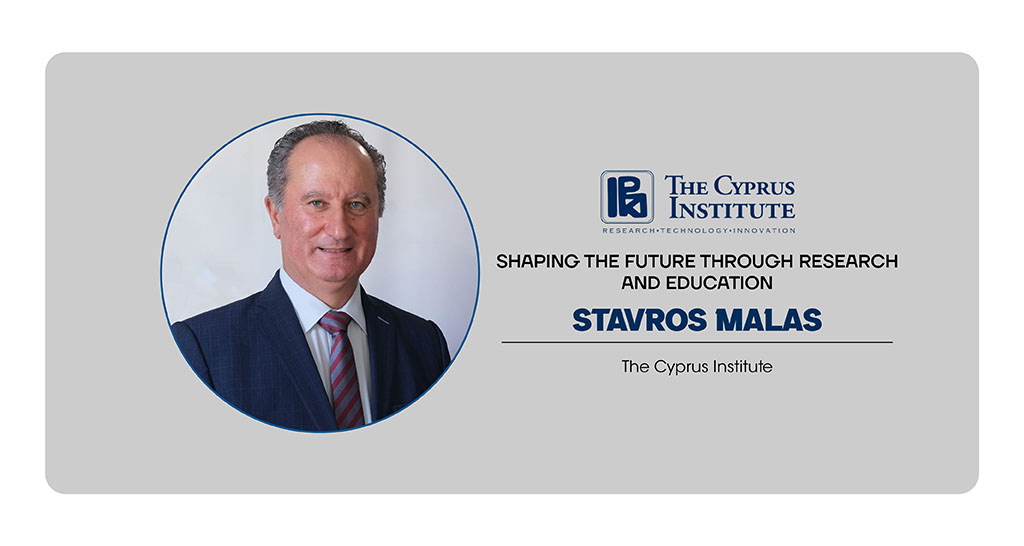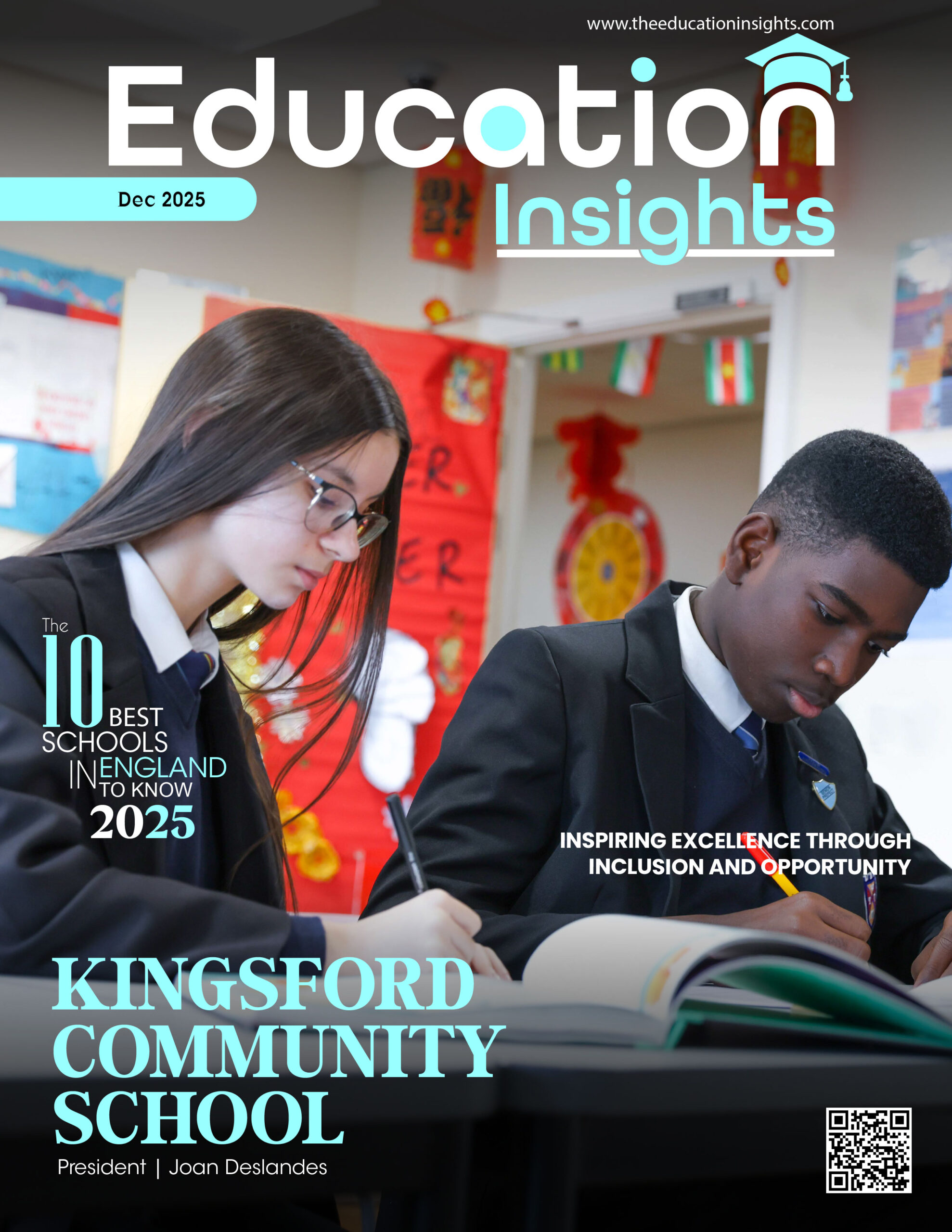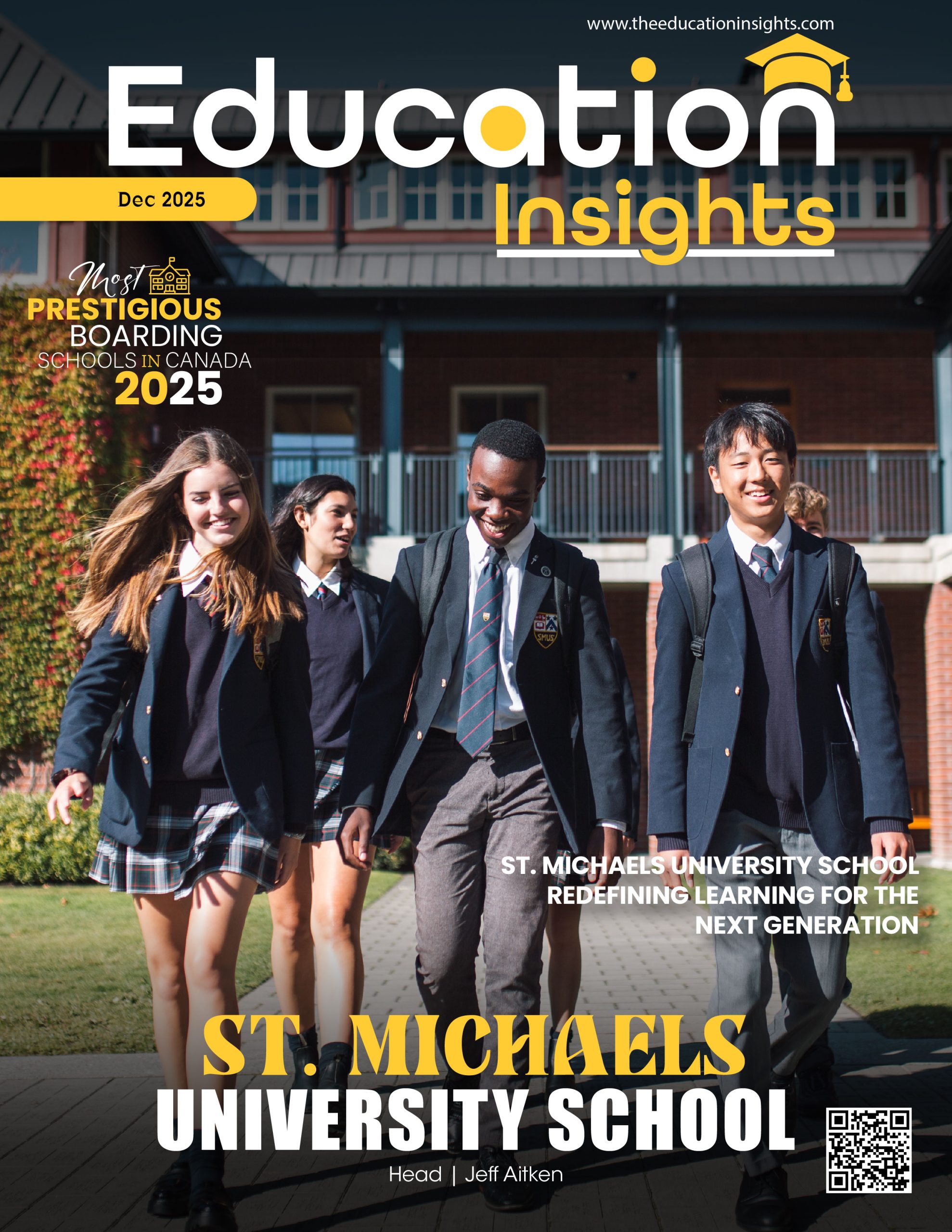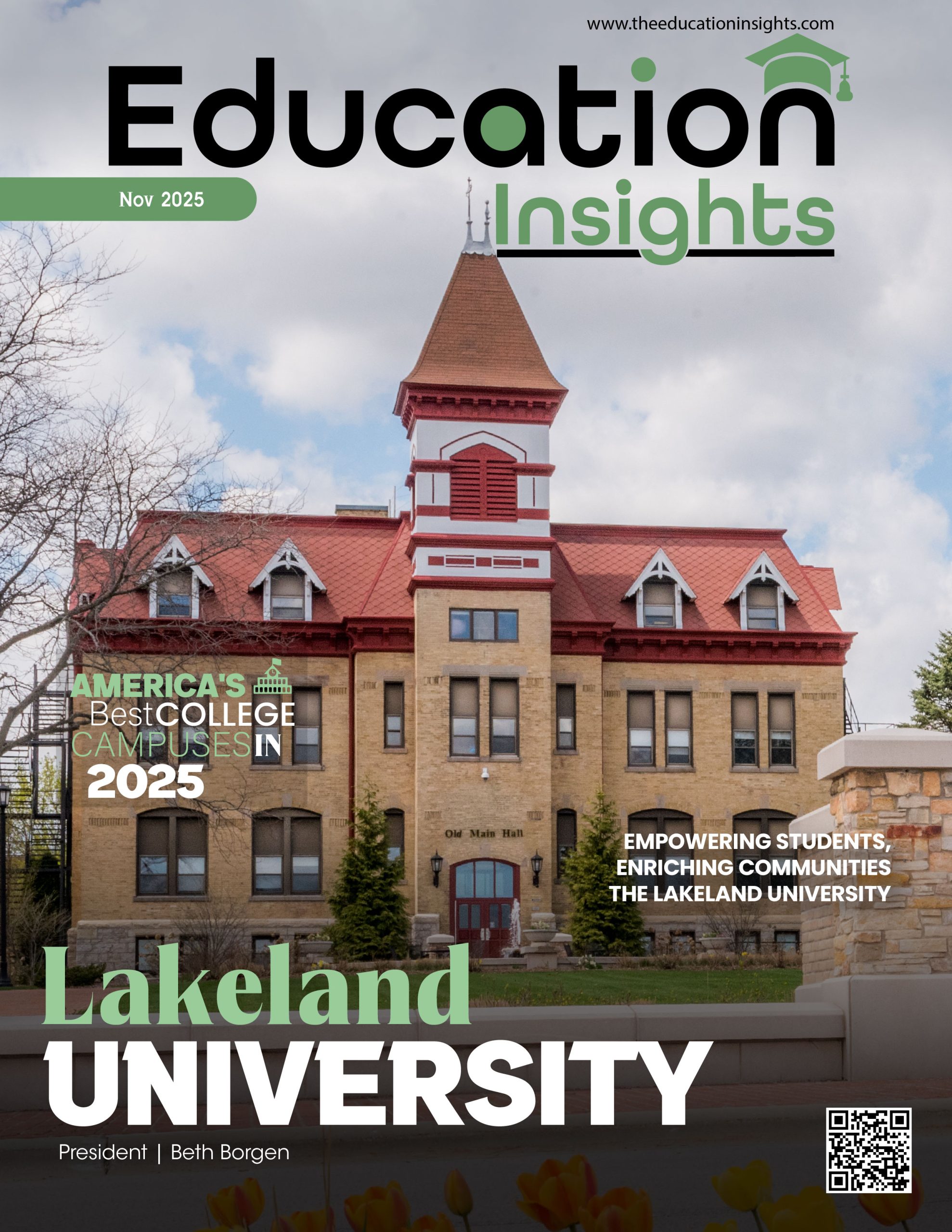Established in 2005 by the Cyprus Research and Educational Foundation (CREF), The Cyprus Institute is a leading non-profit research and educational institution dedicated to scientific and technological excellence. As a regional Center of Excellence, the Institute addresses pressing global challenges through interdisciplinary research and international collaboration. With the ambition to become the EU’s primary hub for research and innovation in the Eastern Mediterranean and the Middle East, it actively promotes peace, prosperity, and regional cooperation.
Recently, Education Insights had the opportunity to speak with Professor Stavros Malas, President and Provost of The Cyprus Institute, to explore the Institute’s mission, impact, and future vision.
Please tell us about The Cyprus Institute.
Prof. Malas) Thank you for the opportunity to present The Cyprus Institute, a leading non-profit research and educational institution with a strong scientific and technological focus. As a regional Center of Excellence, it tackles key challenges of global significance through interdisciplinary research and international collaboration. The Institute aims to serve as the EU’s main hub for research and innovation in the Eastern Mediterranean and the Middle East, promoting peace, prosperity, and regional cooperation. Established by the Cyprus Research and Educational Foundation (CREF), the Institute is governed by an international Board of Directors and structured around five specialized research centers in partnership with world-class institution These are:
- EEWRC (with MIT) – focusing on energy, environment, and water
- STARC (with C2RMF, France) – focusing on archaeology and cultural heritage
- CaSToRC (with NCSA, University of Illinois) – focusing on computational science
- CARE-C (with Max Planck Institute, CEA, Helsinki) – focusing on climate and atmosphere
- STeDI-RC – policy, innovation, and sustainability
CyI hosts unique infrastructures such as the region’s largest academic supercomputer, the PROTEAS solar research facility, USRL, APAC, and the Cyprus Atmospheric Observatory. Its accredited Graduate School offers PhD, Msc, and MPhil programs rooted in the Institute’s research. Students engage directly in cutting-edge projects and benefit from hands-on training, preparing them for leadership in academia, industry, and public policy.
How do you envision the Institute’s role in transforming Cyprus into a knowledge-based economy?
Prof. Malas) Since launching its first research center in 2007, The Cyprus Institute has quickly established itself as a hub of scientific excellence, attracting top international researchers. Cyprus’ strategic location at the crossroads of Europe and the Eastern Mediterranean-Middle East (EMME) region positions CyI as a bridge for research collaboration, supporting both regional cooperation and the country’s transition to a knowledge-based economy. A key example is CyI’s leadership in the Cyprus Government’s Climate Change Initiative for the EMME region, where it coordinates research, informs policy, and fosters regional collaboration to tackle climate impacts. CyI’s accredited graduate programs further strengthen its role by training skilled researchers through hands-on involvement in cutting-edge projects and access to advanced infrastructure, nurturing the next generation of innovators who will drive regional progress. Together, these efforts position CyI as a catalyst for scientific advancement and sustainable development in Cyprus and beyond.
What steps is CyI taking to bridge the gap between academia, industry, and government?
Prof. Malas) At The Cyprus Institute, we actively bridge academia and industry by turning advanced research into practical solutions in energy, climate, digital technologies, and heritage sciences. In energy, we co-develop and test technologies with industry partners. In climate, our high resolution models support business resilience strategies. HPC enables AI-driven services for commercial use, while in heritage science, we collaborate with tech companies through 3D digitization and virtual reconstructions. We also support policymaking by providing evidence-based recommendations on key issues such as the Green Deal, AI, and cultural heritage. All research centers engage stakeholders, and the STeDI-RC combines research with policy support, offering tools and training for policy relevant research. Our Graduate School strengthens industry ties through Industrial PhDs and internships, giving students hands-on experience and improving their career prospects in the knowledge economy.
What are the unique strengths of CyI’s graduate programs compared to traditional universities?
Prof. Malas) Leading research institutions have an outsized impact on science, society, and economic development. The Cyprus Institute’s Graduate School, established in 2010, offers accredited graduate programs for a select group of talented students aiming to become future leaders in research and academia. Fully embedded in CyI’s research environment, students benefit from hands-on training, access to advanced infrastructure, and close collaboration with world-class institutions. The School focuses on globally relevant areas and admits a limited number of highly motivated students based on merit. Programs offered include:
Three Master’s programs in:
- Digital Cultural Heritage,
- Environmental and Energy Sciences
- High Performance Computing and Machine Learning
Three PhD programs in:
- Computational Sciences,
- Energy, Environment and Atmospheric Sciences,
- Science and Technology in Archaeology and Cultural Heritage
Unlike traditional universities, CyI combines research excellence with graduate education, fostering interdisciplinary learning and preparing students to shape the knowledge economy. Generous financial support is available for competitive candidates.
How does CyI ensure that students are well-prepared for leadership roles in academia, industry, and government?
Prof. Malas) Preparing students for leadership is at the core of CyI’s mission. The Graduate School offers selective, research-driven programs where students work alongside experts on complex scientific and societal challenges. Through strong international partnerships, students benefit from joint or dual degrees and access to global research networks. Seminars, workshops, and professional development courses enhance both academic and transferable skills, while the Institute’s inclusive, multicultural setting fosters cross-cultural collaboration and global outlook, key qualities for future leaders in academia, industry, and public service.
What strategies does CyI use to attract and retain top talent, both students and faculty, from around the world?
Prof. Malas) Attracting top global talent is a top priority at The Cyprus Institute. Its strong international partnerships, cutting-edge infrastructure, such as HPC facilities and advanced labs, and success in securing EU funding make it a leading hub for research and education. CyI offers a welcoming, multicultural environment, with English as the working language, and over half of its staff and students come from abroad. A low student-faculty ratio ensures close mentorship and hands-on training, while dedicated support services allow researchers to focus on their work. Cyprus’s safety, climate, and quality of life further enhance CyI’s appeal.
What are some of the most innovative research projects currently being led by CyI students?
Prof. Malas) Students at The Cyprus Institute play a vital role in cutting-edge research that tackles major challenges in the Eastern Mediterranean and beyond. Across our interdisciplinary centers, they apply advanced technologies to real-world problems.
At EEWRC, students develop sustainable energy and water solutions, such as heliostat systems, hybrid solar technologies, and hydrologic modelling using drones and sensors.
At STARC, they advance heritage science through portable scanners, 3D reconstructions, and AI-driven artifact analysis.
At CaSToRC, they contribute to EuroCC2 and work on HPC and AI applications, including agricultural forecasting, image enhancement, and industry collaborations. At CARE-C, students innovate in wildfire detection, carbon mapping, and climate modeling to support national policy and public health. Their work reflects CyI’s mission: interdisciplinary research with technological excellence and regional impact.
How do you see the role of research-oriented graduate education evolving in the coming decades?
Prof. Malas) Research institutions play a key role in advancing human welfare, economic growth, and scientific progress—a role that will only grow with the rise of technologies like AI. Graduate education must adapt to address complex global challenges such as climate change, pandemics, and the societal impact of AI. Future researchers will need not only technical skills but also ethical awareness, strong communication abilities, and interdisciplinary thinking. As AI reshapes research methods, skills like critical analysis, data interpretation, and responsible AI use will become essential. There will be a greater focus on the societal relevance of research, with programs incorporating science communication, public engagement, and policy translation. With fewer academic positions, graduate education will increasingly prepare students for careers in industry, government, and nonprofits through flexible pathways and job-relevant training. Globalization and digital tools will enhance access to education, while ethical training will help researchers consider the broader impact of their work. Overall, graduate education is becoming more interdisciplinary, technology driven, and aligned with real-world needs.
How does CyI integrate cutting-edge technology into its curriculum and research initiatives?
Prof. Malas) Technology is integral to both teaching and research at CyI. Our students and researchers use cutting edge tools to tackle real-world challenges across disciplines. They gain hands-on experience with platforms like the Cy-Tera supercomputer for climate modeling, AI, and physics; the PROTEAS facility for solar energy and storage; and STARC’s advanced imaging tools for cultural heritage. CyI also leads in digital learning through initiatives like DiGiNN, offering training in AI, cybersecurity, and data science. By promoting interdisciplinary collaboration, we ensure students are not only equipped to use current technologies but also to shape future innovations.
What are your thoughts on the increasing role of AI and machine learning in education and research?
Prof. Malas) AI is already transforming research and education, offering faster data analysis, personalized learning, and new insights across fields like climate science, genomics, and digital humanities. In education, AI powers adaptive platforms, virtual labs, and smart tutoring, making learning more accessible. It also streamlines administrative tasks, allowing more focus on teaching. However, challenges remain—AI can reinforce bias, raise privacy concerns, and impact critical thinking and academic integrity. Unequal access to AI tools may widen digital divides. To use AI responsibly, institutions must ensure transparency, embed ethics in curricula, and foster collaboration among educators, technologists, and ethicists. AI holds great promise, but thoughtful integration is key.
Online learning is becoming more prominent—does CyI have any plans to expand its digital education offerings?
Prof. Malas) Absolutely, we are expanding our digital offerings to meet evolving learner needs. New online and blended courses in areas like HPC, machine learning, and digital heritage target professionals and international students. Online components are also being integrated into graduate programs to increase access. Through executive training and partnerships like DiGiNN, CyI supports upskilling in AI, cybersecurity, and other advanced technologies. This reflects our commitment to flexible, high-quality, and accessible education for the digital age.
What role do you see CyI playing in fostering innovation and entrepreneurship in Cyprus and the wider region?
Prof. Malas) CyI began building its innovation and entrepreneurship (I&E) activities in 2016, when Cyprus’s ecosystem was still emerging. Today, it leads in turning research into real-world impact. Through EU-funded projects and in-house innovation, CyI develops technologies, tools, and services that address local and global challenges. Living labs and urban experiments engage citizens and inform public decisions. From renewable energy to digital heritage, our work shows how research can drive practical solutions. We foster open innovation, knowledge transfer, and cross-sector collaboration, bringing people, ideas, and technology together to shape the future.
With more than half of your research staff coming from international backgrounds, how does CyI create an inclusive academic culture?
Prof. Malas) At CyI, we take pride in our international and inclusive community. With staff and students from over 20 countries, we value diverse cultures, perspectives, and backgrounds. Our values-based culture is shaped by the “CyI Companion,” a community-developed guide outlining seven core principles: Diversity, Equality, Inclusion, Respect, Integrity, Solidarity, and Trust. We follow the EU’s HRS4R strategy, ensuring fair recruitment and strong support for international staff. Our commitment is reinforced through policies like the Gender Equality Plan and participation in the Diversity Charter Cyprus. Additionally, English is our working language, supporting integration and collaboration.
How does CyI support researchers and students facing socio-economic barriers?
Prof. Malas) CyI is committed to academic merit as the sole basis for admission and participation. To support students with financial need, we offer full and partial scholarships, often covering tuition and living costs, along with guidance on other funding sources. Most PhD students receive Graduate Research Fellowships, enabling them to work on funded projects and gain professional experience. These measures ensure that talented individuals from all backgrounds can access advanced education and research opportunities.
What can we expect from Cyl in the near future?
Prof. Malas) Looking ahead, The Cyprus Institute will continue advancing wellbeing, resilience, and innovation in Cyprus and the region, creating lasting societal impact. We remain committed to improving quality of life through science and innovation, tackling challenges like climate change, digital transformation, and sustainable development. CyI will further its role as the EU’s research gateway in the Eastern Mediterranean, deepening global partnerships, promoting peace and prosperity, and training future scientists and policy leaders.










